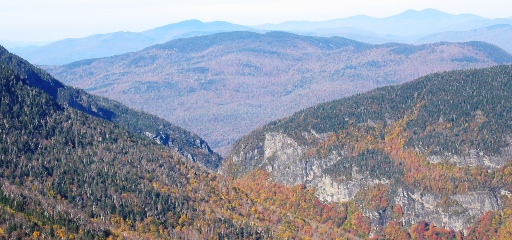The Mountains of Vermont Yankee
 When I am reading an article or a blog post, I always appreciate when the writer places the immediate events into a bigger context. I always try to do this myself. Putting Vermont Yankee issues in context, however, is like facing a huge mountain range. There is always another set of hills beyond this one. Which mountain? Which context? Where to start?
When I am reading an article or a blog post, I always appreciate when the writer places the immediate events into a bigger context. I always try to do this myself. Putting Vermont Yankee issues in context, however, is like facing a huge mountain range. There is always another set of hills beyond this one. Which mountain? Which context? Where to start?
In this post, I'm going to try to look at the mountain range, instead of the individual peaks. That's one way to put Vermont Yankee in context. I hope.
The first mountain: Vermont Yankee and the Constitution
When Entergy brought a lawsuit against the Vermont legislature's attempts to shut down the Vermont Yankee nuclear power plant, it brought the suit on constitutional grounds. It won on constitutional grounds: The Supremacy Clause (federal law is supreme over state laws) and the Commerce Clause. Two good discussions:
District Court Upholds the Rule of Law by George Angwin
Entergy Vs. Vermont In Plain English by Tamar Cerafici

The mountain behind the mountain: Vermont politics and the Constitution
Entergy won on the basis of the Constitution, but apparently Vermont's government doesn't give that much respect to the Constitution. Attorney General Bill Sorrell has brought several other cases challenging the Constitution. He's lost big-time, and cost the state a lot of money. Although he likes "state's rights," he doesn't pay enough attention to citizen's rights. He doesn't adequately protect the rights of ordinary citizens in Vermont.
History of Vermont and the Supreme Court (Constitutional Cases) by Rep. Thomas Koch
Vermont and personal liberties: Citizen's Rights, State's Rights and Vermont by Meredith Angwin
Scaring businesses in Vermont: The third mountain behind the mountain
The Vermont legislature has been on a vendetta against Vermont Yankee, and it hasn't been particularly nice to other businesses, either. Once you throw out constitutional limits on lawmaking, anything goes. The latest plans include taxing Vermont Yankee to death. Of course, other businesses wonder: What business will be next in line?
Collateral Damage by Jeffrey Lewis

The fourth mountain behind the mountain: Vermont Yankee as cash cow
Vermont Yankee has paid a special tax assessment of $10 million dollars, $8 million of which went to clean up Lake Champlain. Lake Champlain is on the other side of the state from the power plant. This tax was the trade-off the legislature made for allowing Vermont Yankee to have a power uprate. Vermont Yankee has paid $30 million dollars to a clean energy development fund. This tax was the trade-off the legislature made for allowing Vermont Yankee to use dry cask storage.
Vermont claims that the federal government has given them no power over a nuclear plant in their own state. True, the state doesn't have the power to set safety standards for the plant, but it seems to have done very well at taxing it! All of these special assessments, however, end with the last day of the plant's current state certificate of public good. That is, the money stream ends on March 21, 2012.
As Emerson Lynn writes: [The legislature] wants it [Vermont Yankee] to go away. But they don't. It's their cash cow.
The Campaign Against Yankee Goes On... by Emerson Lynn
Meanwhile, the legislature's latest scheme for a new tax, a half-million-dollar per year water discharge tax, has caused even Vermont Yankee enemies to look askance. There is a lawsuit going on. Pat Parentau says: It was not a good idea to pass laws targeting Vermont Yankee in "bad faith" during the state's legal battle with the company.
Casting a Shadow by Times Argus Online
The final (maybe) mountain way back there in the mountain range: The Vermont energy plan and how it is failing
Perhaps the final mountain in the background is the Shumlin energy plan. When he took office, Gov. Shumlin was shocked that Vermont's energy plan included Vermont Yankee. In a huge rush, his Department of Public Service put a new plan together without Vermont Yankee. The new plan says that in 2050, 90 percent of the energy used in Vermont will be renewable. Yes, the plan specifies that Vermont will use renewables for 90 percent of pretty much all the energy: Electricity, transportation, and space-heating.
The plan has intermediate goals also, and (surprise) it is failing to meet the first one. The first goal was to have 20 percent of Vermont electricity by renewable power by 2017. It turns out Vermont is going to miss that goal, and the legislature is also backing away from the goal of 30 percent renewable by 2025. These goals just aren't being met in Vermont. There's also been a groundswell of people who are worried about escalating power costs.
Vermont is scaling back the drive for renewable power. As Dave Gram writes: Scaling back the drive for renewable power is a big change for a legislature and administration that have been pushing to close the Vermont Yankee nuclear plant and had touted wind, solar, biomass and other renewable energy sources as keys to fighting climate change tied to burning fossil fuels.
Perhaps that scale-back of Vermont's renewable goals is the final mountain.
Vermont won't make renewable energy goals by Dave Gram/Associated Press
Vermont needs energy innovation that is realistic, rate-friendly by Bruce Lisman

Or is THIS actually the ultimate mountain?
On a practical basis, the Shumlin energy plan is mostly about natural gas and mid-size natural gas plants. Perhaps the gas pipeline to Canada is the ultimate mountain, the one in the distance that overshadows all the rest.
VPR Shumlin Energy Plan Criticized for Natural Gas Component by John Dillon/Vermont Public Radio
_________________________

Angwin
Meredith Angwin is the founder of Carnot Communications, which helps firms to communicate technical matters. She specialized in mineral chemistry as a graduate student at the University of Chicago. Later, she became a project manager in the geothermal group at the Electric Power Research Institute (EPRI). Then she moved to nuclear energy, becoming a project manager in the EPRI nuclear division. She is an inventor on several patents.









